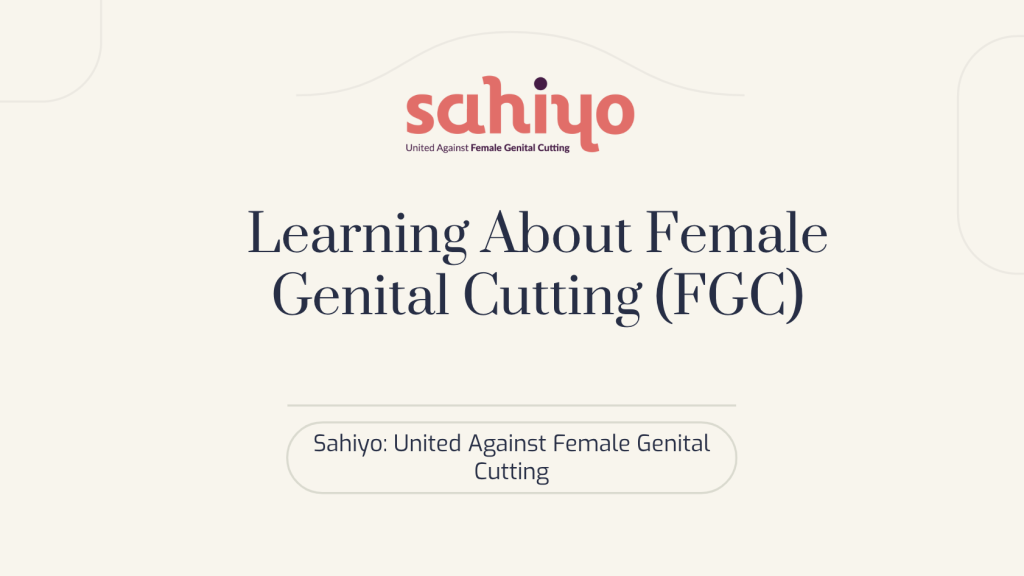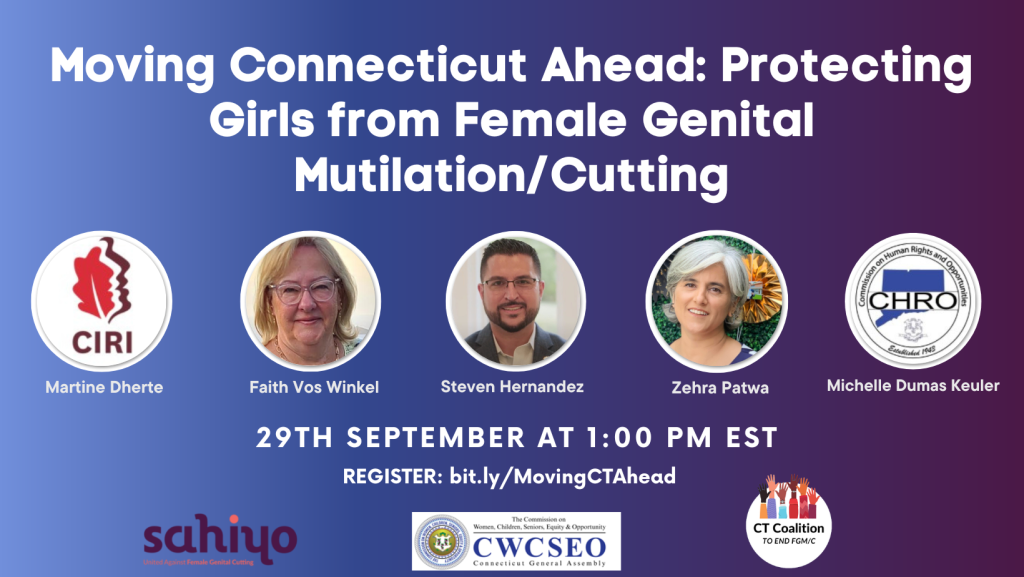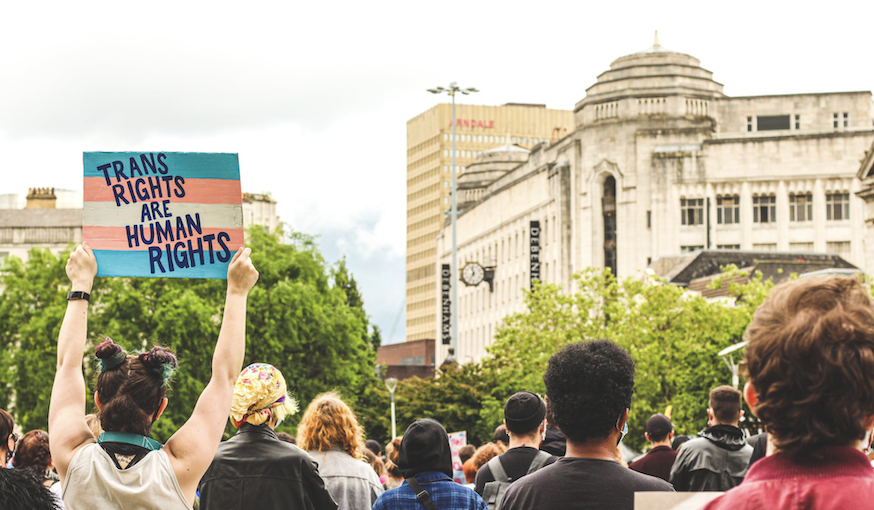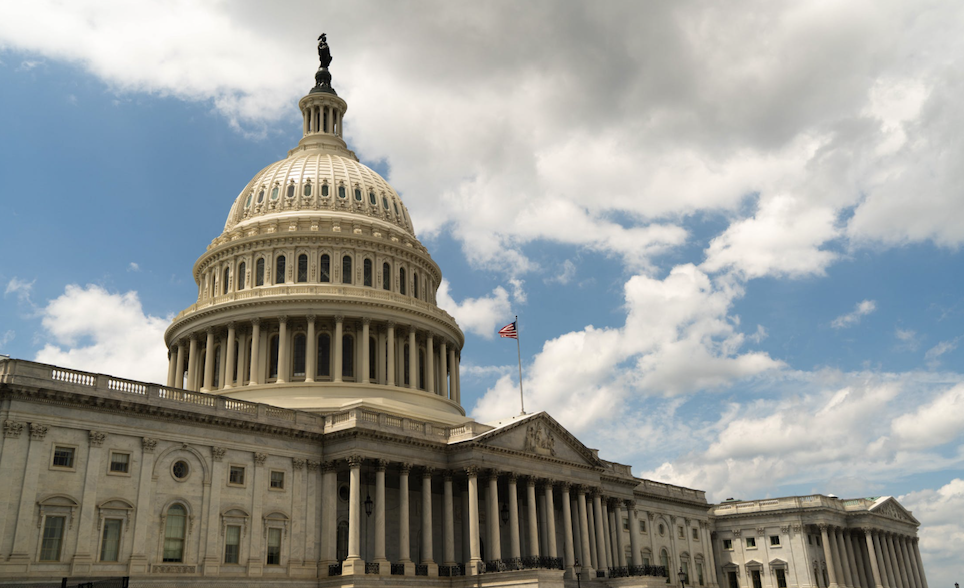My thoughts on the Washington Senate Bill to end FGM/C

By FA When I was a teenager, my family discouraged me from speaking out against khatna, or female genital mutilation/cutting (FGM/C), for fear of repercussions from our community. I wanted to use my voice, but I did not want to disappoint my parents or bring shame to my family. As I followed the Detroit FGM case in 2018, I became increasingly disappointed as it all unraveled. Then I learned about Sahiyo and the amazing work they were doing to end FGM/C; I decided to use my voice to advocate for what I believe to be right. As a part of my advocacy, I am volunteering with the Washington Coalition to End FGM/C. While forty states already have anti FGM/C laws, Washington State does not currently have such a law. A 2016 study ranked the Seattle-Tacoma-Bellevue metro area as the fifth largest metro area in the U.S. in terms of the size of the FGM/C-affected community, which makes this lack of legislation especially concerning. State laws are critical in our journey to end this practice for a variety of reasons. For example, WA Senate Bill 5453, a bill heard on January 30th by the Senate Committee on Law & Justice , will create a private right of action for victims of FGM/C which will allow survivors to stand up for themselves in court when they are ready to do so. It prohibits providers from performing FGM/C on a minors, which helps curtail vacation cutting practices (sending the girl away on a “vacation” abroad with family for her to be cut). It establishes education and outreach initiatives to help teach families about the harms of FGM/C. Moreover, it provides care for victims by strengthening the mandatory reporting requirements to include FGM/C. By adding FGM/C to the mandatory reporting list, it will be legally required for certain fields to report the harm to the authorities (ie. child abuse reporting laws). These civil remedies give victims some of their power back, but it is not enough to deter others from committing this act in the future. In order to discourage community cutters from performing this act, there needs to be a strong deterrent in place. Based on my experiences, there is an enormous amount of cultural pressure to perform FGM/C. The penalties must be heavy enough to deter the cutter, and from what I have seen, monetary fees are not enough. For me, it is important that this bill includes an element of criminalization for those who perform the cutting, in addition to civil remedies. One of the aspects that I love about Sahiyo is the multi-faceted approach taken to end FGM/C. I am proud that the proposed bill reflects this approach and hope that you are able to support its passage.
Washington Senate Bill 5453 concerning female genital mutilation/cutting moves forward in the Senate

On Tuesday, February 14th at 4:00 pm PST, SB 5453 concerning female genital mutilation/cutting (FGM/C) in Washington will move to the Senate Ways and Means Committee and for a Public Hearing. Here is how to get involved: Submit written testimony Testify virtually To vote pro Testify in-person Statement from the Washington Coalition: We are a newly formed Coalition working to end the practice of FGM/C in the State of Washington. We comprise a broad group of survivors, stakeholders and advocates. Forty US States have laws banning the practice of FGM/C. Washington has yet to address this important human rights issue in any manner. This proposed legislation SB 5453 under review today is a good first step towards ending the practice and supporting survivors in Washington State. Review the Washington Coalition’s factsheet to learn more about this bill and its significance.
The hearing for Washington Senate Bill 5453 concerning female genital mutilation/cutting

On Monday, January 30th at 10:30am PST, SB 5453 concerning female genital mutilation/cutting (FGM/C) will be called for a hearing by the Washington state Law and Justice Committee. The bill, which was only introduced on January 18th, aims to: create a private right of action for survivors of FGM/C; prohibit providers from performing FGM/C on a minor; establish education and outreach initiatives to prevent FGM/C; provide care for victims and families of FGM/C. If you live in Washington or have expertise on FGM/C, here are ways to voice support for the passage of legislation: Provide oral testimony during the hearing either in-person or virtually by signing up here. Submit written testimony with this link. Please note that written testimony is due within 24 hours after the hearing. Vote in support of the bill without providing any oral or written testimony here. Sign this Change.org petition created by Abid and Maryum Saifee (this can be done in combination with any of the other options). For more information, take a look at the Washington Coalition’s factsheet to learn more about this bill and its significance. Statement from the Washington Coalition: We are a newly formed Coalition working to end the practice of female genital mutilation/cutting (FGM/C) in the State of Washington. We comprise a broad group of survivors, stakeholders and advocates. Forty US States have laws banning the practice of FGM/C. Washington has yet to address this important human rights issue in any manner. This proposed legislation SB 5453 under review today is a good first step towards ending the practice and supporting survivors in Washington State. Review the Washington Coalition’s factsheet to learn more about this bill and its significance. Additionally, in case you missed the hearing, click here to watch!
Sahiyo presents at the Mitchell Hamline School of Law in Minnesota

On November 2nd, Sahiyo Programs Coordinator Catherine Cox and current volunteer (as well as former Development Assistant) Sarrah Hussein partnered on a presentation for a class at the Mitchell Hamline School of Law in Minnesota on the topic of female genital mutilation/cutting (FGM/C). The presentation included some background on what FGM/C is, it’s prevalence in the U.S., and some legal background in the United States. More specifically, they introduced some of Sahiyo’s past legal work in Massachusetts, and current work to get a comprehensive state-wide law passed in Connecticut . To learn more about Sahiyo’s community education and outreach programs, visit this page on our website.
Reflecting on ‘Moving Connecticut Ahead: Protecting Girls from FGM/C’, a webinar

By Meg Sinnott On September 29th, Sahiyo partnered with The CT Coalition to End FGM/C and The Commission on Women, Children, Seniors, and Equitable Access for All to host Moving Connecticut Ahead: Protecting Girls from FGM/C. This webinar was held to inform legislators, community members, and other stakeholders on the issue of female genital cutting (FGC) and how it impacts girls in the state. Connecticut (CT) remains one of the ten states in the U.S. with no legal protections against FGC. The webinar brought together key individuals living in the state of CT to discuss their reasons for supporting the passage of a law to end the social norm of FGC. Panelists included: Steven Hernandez – The Commission on Women, Children, Seniors, Equity & Opportunity Zehra Patwa – WeSpeakOut Michelle Dumas Keuler – Connecticut Commission on Human Rights and Opportunity Faith Vos Winkel – Connecticut Office of the Child Advocate Martine Dherte – Connecticut Institute for Refugees and Immigrants As a participant of the webinar, I thought that the panelists conveyed their message very effectively and eloquently: CT needs to adopt anti-FGC legislation now. As a former CT resident myself, I was shocked when I first found out that CT does not have a law already. A 2013 Population Reference Bureau study found that 2,658 women and girls in CT are at risk of undergoing or have already undergone FGC. For me, earlier feelings of shock have concretized into a need to take action, which includes helping to facilitate this webinar. I am very proud of the work that is being done by CT advocates, allies, and survivors to amplify awareness of FGC and its impacts, so that lasting change can be made. From conversations I have had with friends and family who live in CT, I’ve observed an assumption that somewhere like CT would not need legislation against FGC; this is due to the misconception that FGC only happens overseas, such as in countries within Africa and Asia. It was also surprising to hear that CT is so far behind other states in terms of protecting the rights of girls and other people using legislation since gender equity is a key priority for the state. In fact, US News & World Report recently lauded CT for its achievements on this issue, especially when it comes to equal access to economic opportunities. But even economic equity is limited when we don’t have the full participation of all of our women and girls. FGC reflects and perpetuates a broader trend of gender inequality. Zehra Patwa, a survivor of FGC and member of the Dawoodi Bohra community, spoke to the social norm piece of FGC through her discussion of how legislation could impact the prevalence of FGC in the Bohra community, which is one that abides by the law of the land and prioritizes the law before traditional practices. She demonstrated the universal truth that every society is influenced by norms that guide behavior and can help to solidify what conduct is acceptable or unacceptable within the group. Individuals may be socially sanctioned for not following social norms, which has been seen in instances of survivors and activists of FGC speaking out against the practice. Michelle Dumas Keuler explained how laws and policies that are shaped by our culture protect human rights, clarifying that CT needs anti-FGC laws (despite the existing federal law) to make prosecution more accessible, as well as to communicate to the wider community that CT is a state that values its girls and protects its citizens from harm. Faith Vos Winkel helped shed light on the impact that laws can have on a community. She expressed that every society has harmful social norms: not too long ago in the U.S. hitting children was considered acceptable. Domestic violence between a husband and a wife was legally permissible up until the 1970s, and it was considered a private matter. One takeaway I had from the webinar was that our knowledge of harmful norms has evolved, and so too has legislation in CT evolved in order to support ending these other harmful practices. The panel discussion made clear to me that in order to truly make an impact, we must support a holistic or multifaceted approach to address FGC, as we have for other harmful social norms like domestic violence, by writing advocacy and educational opportunities into the law. Watch the recording of this webinar here.
Moving Connecticut ahead: Protecting girls from Female Genital Mutilation/Cutting

Date: Sep 29, 2022 Time: 1 PM to 2:30 PM EST (90 mins) Registration Link: bit.ly/MovingCTAhead In partnership with the Connecticut Commission on Women, Children, Seniors, Equity and Opportunity and The Connecticut Coalition to End Female Genital Mutilation/Cutting (FGM/C), Sahiyo will be hosting “Moving Connecticut Ahead: Protecting Girls FGM/C. In 2013, the Population Reference Bureau estimated that 2,658 women and girls in Connecticut (CT) were at risk of undergoing – or having already undergone – female genital mutilation/cutting (FGM/C). FGM/C is a harmful social norm practiced worldwide and the United Nations has declared it a human rights violation. In Connecticut, many other human rights violations stemming from social norms have been addressed through legislation such as human trafficking, child marriage, and conversion therapy. However, Connecticut has yet to address the issue of FGM/C and remains one of 10 U.S. states without any state-level law protecting future generations from this harm. This webinar will explore how Connecticut can move forward to address this issue through legislation to better protect its women and girls from FGM/C. Get to know the panel! Moderator: Steven Hernández Steven Hernández, Esq Executive Director CT Commission on Women, Children, Seniors, Equity and Opportunity CT General Assembly Steven Hernández, Esq. is the Executive Director of the CT Commission on Women, Children, Seniors, Equity and Opportunity, a non-partisan agency of the Connecticut General Assembly. At the Commission, Mr. Hernández serves as the legislative lead for the State’s 2GEN initiative, an approach that puts family at the center of improved community outcomes, and as drivers of long-term economic success. Mr. Hernández proudly serves on several volunteer boards and commissions rooted in public service. He previously served the CT state legislature as Director of Public Policy and Research for the Connecticut Commission on Children. Prior to joining the Commission, Mr. Hernández served seven years as legislative and budget director in the office of Washington, D.C., Council member Jim Graham. Mr. Hernández served as a clerk to two judges in the District’s Court of Appeals and as a consultant to the Washington law firm Baker & Miller, PLLC. He received a Bachelor of Arts Degree from Bennington College in Vermont in 1995 and a Juris Doctor Degree from the Washington College of Law at American University. Speakers: Zehra Patwa Zehra Patwa is the Co-Founder and US Lead of WeSpeakOut, an organization that strives to work for equal rights for Bohra women in all spheres of life, specifically, on Female Genital Mutilation/Cutting (FGM/C) or khafz. She grew up in London and was educated at the University of Bradford Management Centre in the UK and the Université de Montpellier in France. Zehra serves on several Boards, including Integrated Refugee and Immigrant Services (IRIS), and currently serves as Vice-Chair of the Sahiyo US Advisory Board. After discovering well into adulthood, that khatna or khafz (type 1 FGM/C) was practiced in her community and that she, too, had been subjected to it, she decided she could no longer keep silent. Although she has no recollection of the practice being done to her, she is vehemently opposed to it and has been working with WeSpeakOut to expose the practice within, and outside, the community. She currently works in Digital Customer Delivery for the Knights of Columbus in New Haven, Connecticut. Faith Vos Winkel Before Faith’s recent retirement from Government, Faith Vos Winkel began her work with the Office of the Child Advocate in July 2001 and assists the Child Advocate to fulfill her statutory mandates including overseeing the systems of care and protection for children in Connecticut and advocating for their well-being. Faith’s primary responsibilities focus on the review of all unexpected and unexplained child deaths in Connecticut. She is responsible for preparing child fatality cases and conducting comprehensive investigations. Faith represents the Child Advocate on a variety of statewide policy committees including the Suicide Advisory Board, CT Coalition Against Domestic Violence Fatality Review Committee, and the Governor’s Task Force on Justice for Abused Children. Ms. Vos Winkel has an undergraduate degree from the University of Connecticut and a Masters of Social Work from the University Of Connecticut. Martine Dherte Martine Dherteis the Program Manager for refugee services at the Connecticut Institute for Refugees and Immigrants. She uses her platform to educate newly arrived refugees resettled by her organization in Bridgeport. She would like her programs, which currently includes GBV services to address FGM and become a stronger advocate in the field. She is passionate about protecting women and girls from all forms of abuse. Michelle Dumas Keuler Michelle Dumas Keuler is the Managing Director of the Housing, Training and Appeals divisions of the Legal Division and Commission Counsel with the State of Connecticut Commission on Human Rights and Opportunities (“CHRO”). Founded in 1943, the CHRO is the nation’s oldest state based civil rights organization. The Commission is charged with investigating and prosecuting cases of employment, housing, public accommodation and credit discrimination. As a Managing Director, Ms. Dumas Keuler represents the agency in its prosecution of employment, housing and public accommodation discrimination cases before agency Human Rights Referees, in state court, and federal court. Ms. Dumas Keuler has extensive experience training in the areas of housing, employment and public accommodation discrimination, employer best practices and sexual harassment discrimination. She has trained countless landlords, tenants, housing authorities, state and municipal employees and employers regarding discrimination statutes and their enforcement by the CHRO. Ms. Dumas Keuler also works on policy for the Commission and is active in promoting the legislative initiatives of the agency.
Gender-Affirming Treatments are not Female Genital Cutting

By Hunter Kessous Female genital cutting (FGC), which is the practice of removing or harming the female genitalia for non-medical reasons, is a human rights violation recognized by the UN. Right now, legislators in Texas and Idaho are looking to use pre-existing bans on FGC to block transgender youth from receiving life-saving, medically necessary gender-affirming treatments. This is a discriminatory action that has no basis in the crucial work to end FGC. Gender-affirming care can include social interventions, pubertal suppression, hormone therapy, and gender-affirming surgeries. Social interventions are typically the first step; use of a new name and pronouns, wearing different clothing, and engaging in new activities are often a part of this process. Pubertal suppression is a method of delaying puberty, and hormonal therapy causes secondary sex characteristic development that aligns with one’s gender. Both are reversible and associated with better mental health outcomes for transgender youth. Gender-affirming surgeries, such as mastectomies and vaginoplasty, are irreversible treatments performed on older adolescents who have shown a consistent gender identity and have stable mental health and parental support. Research has shown that these treatments lead to decreased rates of depression, improvement in psychosocial functioning, and minimal long-term side effects. Transgender and nonbinary adolescents experience anxiety, depression, and suicidal ideation at higher rates than cisgender people. According to a report from The National Center for Transgender Equality, 40% of transgender people in the U.S. had attempted suicide at some point in their lives, which is nearly nine times the nationwide suicide rate. Gender-affirming care can significantly improve this mental health crisis. Governor Greg Abbott of Texas was most definitely mistaken when he said “any type of genital mutilation is child abuse” regarding gender-affirming surgery; it is not mutilation, and denial of this care could be more accurately called a form of child abuse by failing to treat serious mental health needs. Texas has attempted to pass several laws that ban transgender youth from access to puberty blockers, hormone therapy, and surgery. Just last year, two of these bills died in session. These failed attempts have led legislatures to turn to FGC laws as a way of making gender-affirming surgery illegal for transgender kids. Idaho is taking discriminatory actions similar to Texas. Earlier this month, a bill that would amend the state’s existing law on FGC to ban hormone therapy, puberty blockers, and sex reassignment surgeries cleared a House committee. The amendment would also make it a felony for doctors to provide these services, placing physicians in the tragic position of needing to risk their medical license if they want to provide life-saving care to transgender adolescents. The senate opposes this bill, so, fortunately, it is unlikely to pass. Disappointingly, their reasons for opposing the bill are neither because they see the necessity of gender-affirming care nor because they disagree with conflating this care with FGC. Rather, they do not see the bill as necessary, as many Idaho physicians are unwilling to provide gender-affirming care anyway, and fear the bill undermines the parents’ authority to make decisions for their children. Texas’s and Idaho’s legislators justify their actions with claims that these medical interventions are similar to FGC in that they are both unnecessary. Yet, gender-affirming care has medical benefits (e.g. improving mental health), while FGC does not. In fact, FGC often leads to harmful psychological outcomes, including PTSD, anxiety, and depression. Another faulty comparison drawn between FGC and gender-affirming care is that they are both irreversible. It is true that FGC has irreversible physical and psychological harms, but this is not the case for all treatments for transgender youth. Again, health professionals consider pubertal suppression and hormone therapy to be reversible. Gender surgery is permanent, but research has shown that regrets about having this procedure are very rare. The benefits of gender-affirming care (improved psychosocial functioning and autonomy over one’s gender identity) paired with the high risk of withholding treatment (worsened mental health outcomes, suicidal ideation and use of non-prescription hormones) support the importance of providing this care. Lastly, medical care for transgender people is their choice as part of their right to bodily autonomy, whereas FGC violates a girl’s right to bodily autonomy. Minors are often forced to undergo FGC and are too young to fully understand what is occurring and give their consent. Furthermore, consent cannot be given when there is coercion. FGC often exists as a result of societal pressure placed on girls who are told FGC is necessary for them to be a woman, to be a member of their own culture and society, and to be married. Consent can not be freely given to undergo FGC, because coercion will always be a dangerous factor. It is harmful and incorrect to conflate FGC with gender-affirming care. I want to make clear that FGC survivors and transgender and non-binary people are not mutually exclusive communities. People who have undergone FGC and do not identify as a cisgender woman in particular would be harmed by legislation that defines gender-affirming treatments as FGC. To learn more about the nuanced experiences of non-cisgender survivors of FGC, I recommend Dena Igusti’s article on being a non-binary survivor and Dear Massi’s advice column for a transgender man who underwent FGC as a child.
DC’s “Female Genital Mutilation Prohibition Act of 2021”

On February 28th, Councilmember Charles Allen, Chairperson of the Committee on the Judiciary and Public Safety, convened a public hearing to consider Washington DC District Bill 24-0516, the “Female Genital Mutilation Prohibition Act of 2021.” The stated purpose of the “Female Genital Mutilation Prohibition Act of 2021” is to prohibit the female genital mutilation/cutting (FGM/C) of a person under care, to expand mandated reporting requirements to include FGM/C, and to provide for a civil action for FGM/C. As the hearing was conducting virtually, advocates working to end FGM/C across the country joined in to provide expert testimony on the topic. To learn more about the bill, visit here. To keep up to date with tracking of the bill, visit here.
